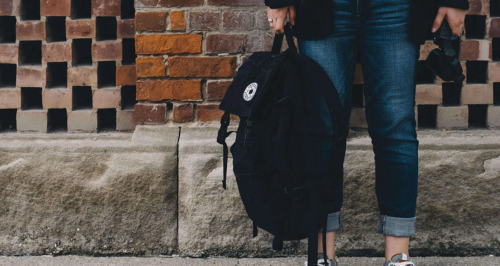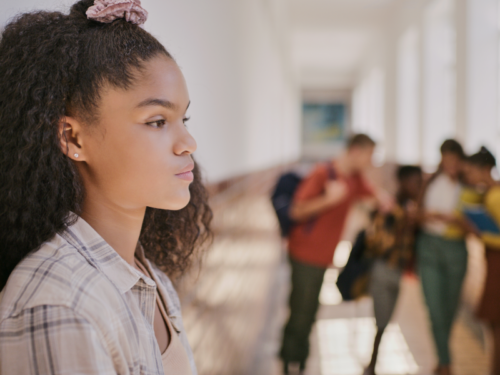
Table of Contents
How Mass Violence Affects Teen Mental Health

Written By: Dr. Caroline Fenkel, DSW, LCSW
June 24, 2022
6 min.
Teens who are exposed to school shootings and other acts of mass violence are at increased risk for anxiety, depression, and other mental health consequences.
Learn more about our Clinical Review Process
Table of Contents
Trigger Warning: This article includes intense language around gun violence, trauma, and violence against children. Please engage in self-care as you read this article.
The United States has witnessed 278 mass shootings so far in the year 2022. By the time you read this, that number will almost certainly be higher.
Sadly, this is nothing new—especially in schools. According to an Everytown analysis, there were approximately 550 incidents of gunfire on school grounds from 2013 to 2019—resulting in 129 deaths and 270 people wounded.
A mass shooting is defined as an incident in which four or more people are shot or killed (excluding the shooter), according to a nonprofit research group called The Gun Violence Archive. The news primarily highlights mass shootings at public locations like schools, malls, and grocery stores, but many of these violent events actually occur at home.
Even if you’ve never directly witnessed a mass shooting or other forms of violence, you know that it happens to teens and young people at school and other places you frequent as part of your everyday life. So how exactly are teens supposed to stay safe when it feels like violence is ubiquitous?
It’s a valid question and one that public health professionals, among others, are trying to answer. In the meantime, Charlie Health is here to encourage you to prioritize your mental health and practice coping methods to help combat anxiety and stress related to these traumatic events.
The impact of mass shootings on mental health
Mass shootings take a mental health toll on everyone. They affect not only the teens, teachers, and families who witness the violence firsthand, but also the teens, teachers, and families who are living in fear that their community might be next. Between the morning newspaper, nightly news, and social media, we’re inundated with exposure to mass violence and the horror and heartbreak that follow.
So how exactly are we supposed to carry on with life as usual? It can be difficult, and stress, anxiety, confusion, and fear are all normal and common reactions.
According to a recent study looking at more than 2,000 11th and 12th graders, concerns about school violence or shootings were linked to an increased likelihood of reporting anxiety and panic symptoms 6 months later. When the researchers focused on Black students in particular, they also noted an association between concern about school violence and future depression.
Another report from 2021 also studied the effects of mass shootings on the mental health of children and adolescents. They found that young children (ages 2 to 9 years old) who were directly or indirectly exposed to violence had higher rates of post traumatic stress disorder (PTSD), but youth ages 10-19 years old had to experience several exposures to violence (direct or indirect) before experiencing symptoms of PTSD. That said, the researchers noted that constant news stories and social media updates could be responsible for short-term psychological effects in teens, such as increased fear and decreased feelings of safety.
What does mass violence mean for teens?
It’s common for teens who experience mass violence to have trouble resuming their normal routine. Common issues for those who experience direct, and sometimes even indirect, exposure to violence include:
- Difficulty falling or staying sleeping
- Nightmares
- Feeling sad, confused, angry, or fearful that the mass violence will occur again
- Feeling jumpy or irritable
- Disinterest in things that used to matter or were important
- Headaches, stomachaches, or a change in appetite
The fear and apprehension can be even more acute when the mass violence targets a specific group of people that a teen identifies with. For example, violence directed at a person or group’s sexual orientation, gender, or politics can have lasting implications on a teen’s sense of safety, support, and acceptance.
Research also shows that exposure to mass shootings, as well as violence of any kind, can have decades of mental health implications. Teens who were either a victim or witness of interpersonal violence have a higher risk for post traumatic stress disorder (PTSD), major depressive episodes, and substance abuse, in addition to difficulties in school.

How to cope with the stress and anxiety
Allow yourself time to process
We all respond to traumatic events in our own way. As a teenager, in particular, it can be overwhelming to navigate the variety of emotions that follow exposure (direct or indirect) to mass violence such as school shootings.
Fear, concern, vulnerability…regardless of what you feel, take time to acknowledge feeling it so that you don’t hold onto those emotions for too long. Repressed emotions can cause irrational and even unhealthy behaviors, so dedicate time to processing how you feel and how those feelings impact your view of the world.
Do you need more support with
your mental health?
Charlie Health can help.
Prioritize self-care
We talk a lot about self-care here at Charlie Health, and for good reason. Self-care is a valuable tool for coping with stress and anxiety. Just a few small habits can be key to ensuring that you’re prepared to handle whatever comes your way. Getting enough sleep, journaling, moving your body, and eating a balanced diet are all simple ways to cultivate positive mental health and help build resilience.
Seek mental health support
Sometimes self-care alone isn’t enough to help people manage their stress, especially related to traumatic events like mass violence. That’s where intensive outpatient therapy can help. Whether it’s cognitive behavioral therapy (CBT), dialectical behavior therapy (DBT) skills, or mindfulness practices, consider seeing a mental health professional to discuss your feelings, symptoms, and ways to cope.
Connect with others
Support groups can be a great way for teens to share their emotions and experiences, while learning how to process their feelings. The National Alliance on Mental Illness (NAMI) offers various resources, including peer support groups and support groups for family members.
It’s also helpful to connect with friends and family members, particularly those who seem noticeably upset about the news. Keep an eye out for any changes in mood, energy levels, or eating and sleeping habits and be sure to offer your support.
Take a news break
Daily headlines jump at us from newspapers, TVs, our phones, our friends—making it hard to avoid what’s going on in the world. You may be tempted to monitor a tragedy in real time, but this can cause even more stress. Media portrayals of shootings and mass deaths have been shown to cause acute stress and posttraumatic stress symptoms, so try taking a break from your phone for at least a few hours per day.
Be a beacon of love
If the idea of a world full of hate has you feeling down, consider finding a way to spread love and foster change. Parents, politicians, school administrations, and safety officers are all doing their part to improve your community’s safety, but there’s plenty of room for teens to help as well. Organize a charity drive to support school shooting survivors, volunteer with a violence prevention organization, check in on your friends who seem to be struggling; there are countless ways to combat those feelings of vulnerability by doing good.
Connect with Charlie Health and our community
Many teens feel embarrassed or overwhelmed by their mental health struggles, and we’re here to let you know that there’s no shame in seeking help. Whether you’re exploring treatment options for the first time or searching for extra support, Charlie Health can help you learn coping skills in a safe, supportive space.
Our intensive outpatient treatment programs provide a high-quality, comprehensive treatment solution that includes supported groups, family therapy, and individual therapy. Ready to give it a try? Our compassionate, experienced team of clinicians is here to listen to your needs, answer your questions, and help you start the healing process today.
References
https://www.gunviolencearchive.org/query/0484b316-f676-44bc-97ed-ecefeabae077
https://www.gunviolencearchive.org/explainer
https://everytownresearch.org/report/preventing-gun-violence-in-american-schools/
https://www.apha.org/-/media/Files/PDF/factsheets/200221_Gun_Violence_Fact_Sheet.ashx
https://jamanetwork.com/journals/jamanetworkopen/fullarticle/2785658
https://link.springer.com/article/10.1007/s11920-021-01222-2
https://www.ncbi.nlm.nih.gov/books/NBK207191/
https://pubmed.ncbi.nlm.nih.gov/12924674
https://www.charliehealth.com/post/ways-to-practice-self-care-as-a-teen
https://www.apa.org/topics/resilience





